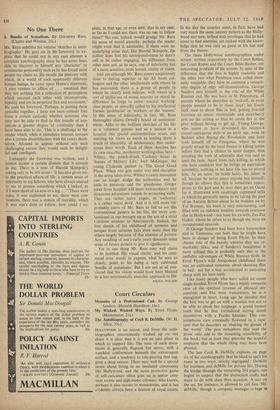No One There
A Bundle of Sensations. By Goronwy Rees. (Chatto and Windus, 21s.)
Ma. REES subtitles his volume 'sketches in auto- biography.' He goes on in his foreword to ex- plain that he could not in any case attempt a complete autobiography since he has never been able to discover in himself any 'character' or continuous personality such as he has found most people lay claim to. He recalls the pleasure with which, in a world of such apparently different human beings, he came upon Hume's statement, 'I may venture to affirm of . . . mankind that they are nothing but a collection of perceptions which succeed each other with inconceivable rapidity and are in perpetual flux and movement.' He ends his foreword, 'Perhaps, in putting these episodes together, I have not been entirely free from a certain curiosity whether someone else may not be able to find in this bundle of sen- sations a greater degree of continuity than I have been able to do.' This is a challenge to the reader which, while it stimulates interest, arouses also a certain dissatisfaction with the essays them- selves. Allowed to appear without any such challenging excuse they would each be delight- ful and intelligent.
Unhappily the foreword was written; and cannot escape a certain distaste that it arouses in me. There is a note of Harold Skimpole's asking only to be left alone : 'It has also given me, in the practical affairs of life, 'a certain sense of inferiority to my fellows, who have always seemed' to me to possess something which I lacked, as if I were short of an arm or a leg. .. ."There were rules, it was explained to me, there were con- ventions, there was a system of morality, which it was one's duty to follow; how could I ex-
plain, at that age, or even now, that in my case, as far as I could see, there was no one to follow them?' No one, indeed, would grudge Mr. Rees his sense of moral anarchy, perhaps the reader might even find it admirable, if there were no underlying sense that, like Harold Skimpole, the author does feel his unresponsiveness to duty's call, to be rather engaging, his difference from other men not, as he says, one of inferiority but of a more sensitive, more honest, clarity of vision.
And yet although Mr. Rees comes suspiciously
close to feeling superior to his All Souls col- leagues and the other intellectuals with whom he has associated, there is a group of people to whom he clearly feels inferior, with whom in a sort of idyllic sea of moral anarchy or moral in- difference he longs to swim—amoral working- class people, so absurdly called by his intellectual friends 'proletariat' or 'workers' or the 'masses.' In this sense of inferiority, in fact, Mr. Rees
thoroughly shares Orwell's brand of sentiment- alism. Alike in the brilliant sketches of his life as a volunteer gunner and as a patient in a hospital this special sentimentalism arises, not marring his views so much as lending them a touch of absurdity, of adolescence, that under- mines their worth. Each of these sketches has its own anarchic, incoherent working-class hero— Whitey, the punch-drunk Cockney boxer in 'Scenes of Military Life,' Jock McGregor, the young Clydeside patient in 'The Great Good Place.' When war gets under way and discipline in the army takes over, Whitey's canny innocence can no longer dodge the authorities and he ends in paranoia and the glasshouse. Ginger away from hospital will meet 'extraordinary and disastrous adventures outside its protecting walls.' They are rather naïve angels, as 'authority' is a rather naïve devil And it is still more im- probably naïve of Mr. Rees to fail to see this conventional pattern in his life, the more con- ventional in one brought up as the son of a strict Calvinist minister in Aberystwyth. Indeed, the first sketch of his childhood of sermons and escapes from sermons fails even more than the others largely because of this absence of pattern. Any recalling of one's early years demands some sense of future pattern to give it significance.
Yet in one thing Mr. ,Rees may well claim to be justified. His visual clarity, and his com- mand over words to express what he sees so clearly, point to his being a very cultivated 'bundle of sensations.' But I am not at all con- vinced that his vision would have been blunted by a less sentimentally anarchic approach to life.
ANGUS WILSON






















































 Previous page
Previous page